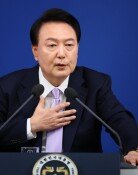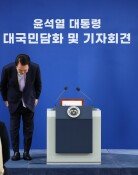No mercy in bank scandal probe
Prosecutors plan to summon for questioning a former chief of the nations financial watchdog in widening their investigation into the Busan Savings Bank Group scandal. Kim Jong-chang, former governor of the Financial Supervisory Service, was allegedly asked for a favor by former auditor of the Board of Audit and Inspection Eun Jin-soo, who allegedly lobbied for the bank. Kim served as vice chairman of the financial regulator and president of Industrial Bank of Korea from February 2000 through February 2004. He was chief of the financial watchdog from March 2008 through March this year. Kim was a board member of the real estate trust company Asia Trust before moving to the Financial Supervisory Service. Asia Trust participated in new stock issuance at the bank last year. There are so many loopholes. The public will be shocked and frustrated if a former chief of the financial watchdog turns out to have covered up illegal activities and corruption at a savings bank.
In March, Park Jie-won, former floor leader of the main opposition Democratic Party, told Ha Bok-dong, acting head of the Board of Audit and Inspection, Busan Savings Bank is not subject to audit. Many savings banks are being hit by illegal and expedient audits by the board. In April last year, Park told then audit chief Kim Hwang-sik (now prime minister), (The board) demanded that Korea Deposit Insurance Corp. had over internal documents of savings banks. Is there legal grounds to probe private financial institutions? His comments apparently show he was trying to cover up illegal activities of savings banks, including Busan Savings Bank, and thus cannot qualify as the head of his party`s savings banks investigation committee.
The Democratic Party also raised suspicion against presidential secretary for civil affairs Kwon Jae-jin, presidential secretary for political affairs Chung Jin-seok, and senior secretary for political affairs Kim Doo-woo. The three figures criticized the opposition party for committing "typical political mudslinging." Despite lack of evidence that these officials committed graft, the case should be thoroughly examined since the opposition party raised the issue.
The scandal constitutes large-scale bank fraud in which majority shareholders and top executives made illegal loans and embezzled money worth more than 7 trillion won (6.5 billion U.S. dollars). Before the Asian currency crisis of 1997, Busan Savings Bank was a small institution even in the non-banking sector, but rapidly grew in prominence under the Kim Dae-jung and Roh Moo-hyun administrations. Park Yeon-ho, the bank`s largest shareholder and chairman, was arrested in 2003 for manipulating stock prices and financial statements. Yet he continued to thrive. Had powerful figures not protected him, he could never have remained on the scene for more than 10 years.
The consensus is that the bank`s majority shareholders and executives lobbied the previous Kim and Roh administrations to grow in size and survive under the incumbent administration. Prosecutors must investigate everyone implicated in the scandal, including those holding a position with the incumbent government or who had one in previous administrations. Presidential office staff, former Democratic Party floor leader Park and former Financial Supervisory Service Chairman Kim are no exception.
Busan Savings Banks closed executive organizational structure based on academic, personal and political connections is also to blame. Top executives that made illegal loans to Park Yeon-ho and Vice Chairman Kim Yang, as well as Park Hyun-sun, chairman of Haedong Construction and the bank`s second-largest shareholder, all went to Gwangju Jeil High School.
Jang In-hwan, head of KTB Asset Management who led Samsung School Scholarship Foundation and Pohang University of Science and Technology to each invest 50 billion won (46.5 million dollars) in the bank, is also from the same high school. Jang is fund management member of the foundation and a fund management adviser to the university. The bank`s rating fell to the below-investment grade of "BB" after its non-performing loans reached 200 billion won (186 million dollars) but still invested 100 billion won (93 million dollars). The bank`s internal decision-making process is highly suspicious.
I came under significant external pressure while probing savings banks as audit chief, Prime Minister Kim said. Having attended the same high school with Busan Savings Bank executives, he must tell of the pressure he went through.
Following the Asian currency crisis, the government injected public funds worth 11.5 trillion won (10.5 billion dollars) into mutual credit cooperatives (now savings banks) to disposal of bad loans, including a substitute deposit payment. Certain savings banks including Busan Savings Bank grew fast under this process while majority shareholders and executives ran amuck with illegal activities. Savings banks now face mounting non-performing loans and more than 10 trillion won (9.3 billion dollars) in additional public funds will be injected. This scandal will cost more than 22 trillion won (20.5 billion dollars), or 6 percent of the national budget this year. Everything about the case should be disclosed and those responsible should be brought to justice.







